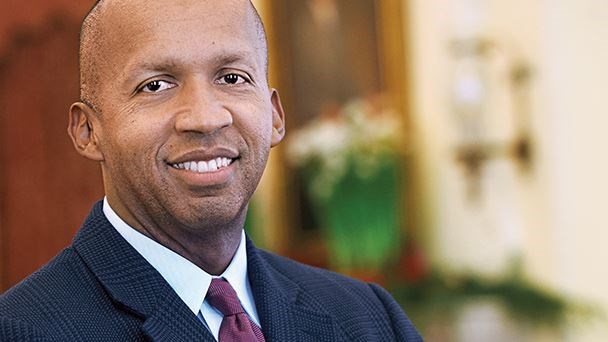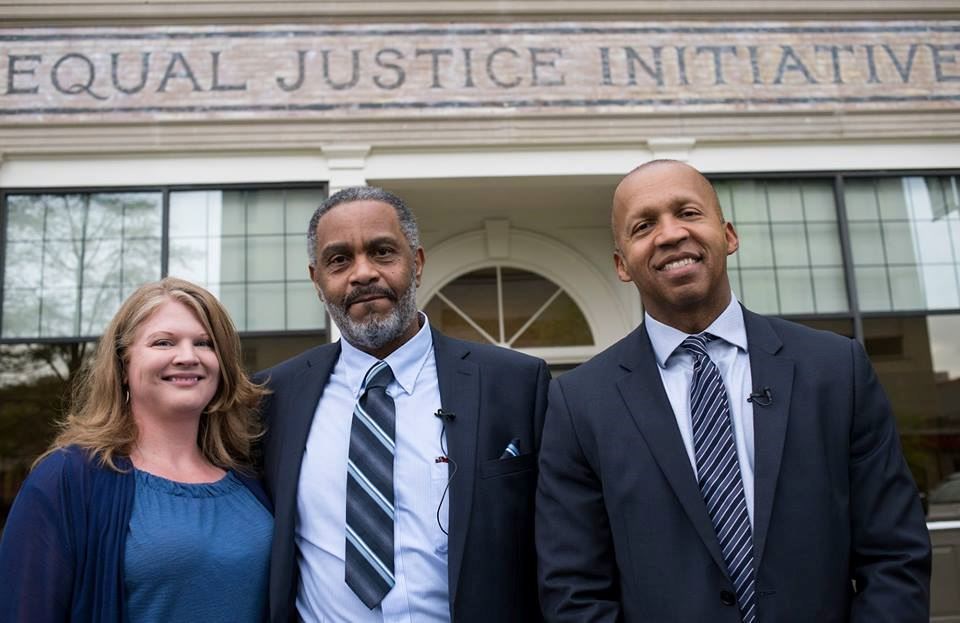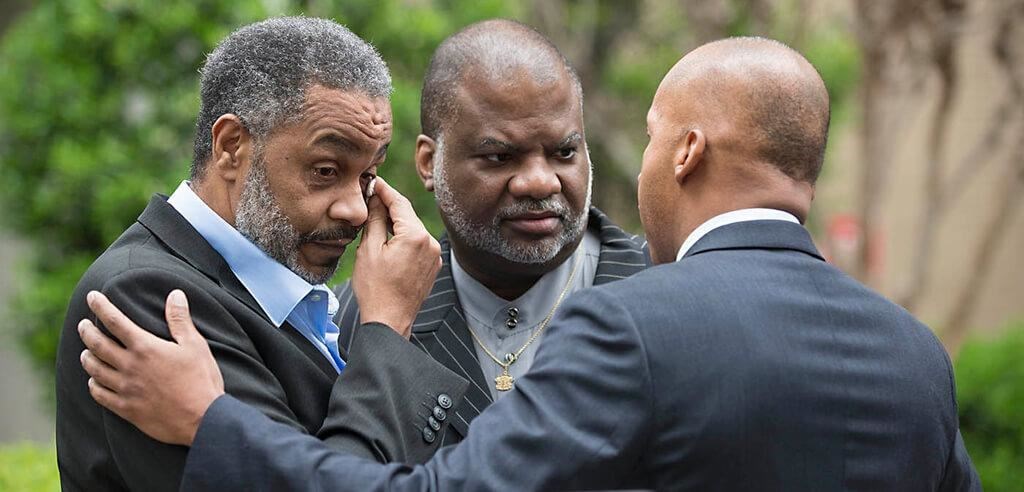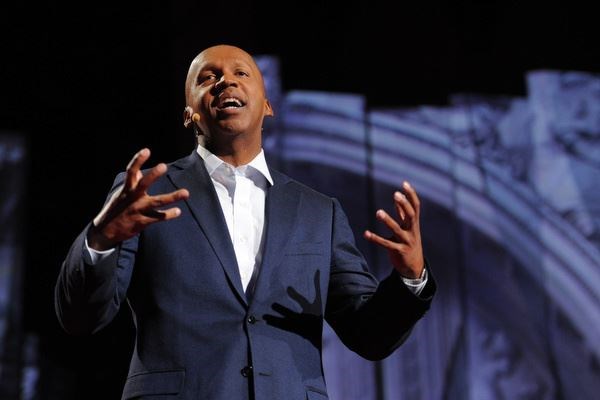“The true measure of our character is how we treat the poor, the disfavored, the accused, the incarcerated, and the condemned.”
-Bryan Stevenson
 Bryan A. Stevensonwww.law.nyu.edu“Love is the motive, but justice is the instrument.” -Reinhold Niebuhr. Bryan Stevenson, a defense attorney and human rights activist, is the perfect example of someone who spreads love through justice. Stevenson has faced opposition all his life, having grown up in an impoverished and segregated area of southern Delaware. However, he never allowed his unfortunate circumstances to hold him back, and eventually graduated from Harvard with a degree in law. Stevenson then began an internship at the Southern Prisoners Defense Committee, providing legal aid to death row prisoners in Georgia. Through this work, he discovered his passion for helping oppressed people given unfair sentences for crimes they often did not commit. Stevenson founded the non-profit organization, Equal Justice Initiative (“EJI”), where he continues to represent and advise prisoners to this day. He works specifically to aid oppressed people, including youth, African Americans, and the poor. A hero is a person who dedicates their life to a greater cause and works tirelessly towards a better future by displaying love for others through sacrifice and service. Bryan Stevenson’s remarkable selflessness, unfailing persistence in the pursuit of justice, and incredible mercy for even the lowest members of society make him a hero and inspiration for all who hope to achieve a more fair and equal world.
Bryan A. Stevensonwww.law.nyu.edu“Love is the motive, but justice is the instrument.” -Reinhold Niebuhr. Bryan Stevenson, a defense attorney and human rights activist, is the perfect example of someone who spreads love through justice. Stevenson has faced opposition all his life, having grown up in an impoverished and segregated area of southern Delaware. However, he never allowed his unfortunate circumstances to hold him back, and eventually graduated from Harvard with a degree in law. Stevenson then began an internship at the Southern Prisoners Defense Committee, providing legal aid to death row prisoners in Georgia. Through this work, he discovered his passion for helping oppressed people given unfair sentences for crimes they often did not commit. Stevenson founded the non-profit organization, Equal Justice Initiative (“EJI”), where he continues to represent and advise prisoners to this day. He works specifically to aid oppressed people, including youth, African Americans, and the poor. A hero is a person who dedicates their life to a greater cause and works tirelessly towards a better future by displaying love for others through sacrifice and service. Bryan Stevenson’s remarkable selflessness, unfailing persistence in the pursuit of justice, and incredible mercy for even the lowest members of society make him a hero and inspiration for all who hope to achieve a more fair and equal world.
 Stevenson and associates outside of Equal Justice Initiative headquarterswww.thegoodbeginning.comThe many sacrifices Stevenson makes for others, even strangers and prisoners, make him a hero. His “ascetic” way of living benefits his clients and organization. Stevenson “lives on his N.Y.U. earnings and takes no salary from E.J.I. His personal style is nearly ascetic … Stevenson must raise the six-million-dollar budget [for EJI] virtually alone … He travels incessantly … [and] has cultivated a network of supporters around the country” (Toobin). All of the effort Stevenson directs towards his organization demonstrates his incredible selflessness. He voluntarily sacrifices personal comforts and luxuries for the happiness of others and expects no reward for all his troubles. Stevenson simply values the lives and well-being of his clients, and their prosperity is all he desires. His deep care for others motivates him to succeed, even at the cost of an easy life. Even though Stevenson could be very financially successful as an attorney, he chooses not to charge his clients because of his selfless nature: "Since its inception, EJI has won reversals, relief, or release for more than 115 wrongly condemned death-row prisoners as of 2015. Stevenson did not charge his clients, but instead relied on contributions and grants. He stated … 'Obviously there were ways to have made a lot more money and to have had more leisure. But I wouldn't choose that. I feel rich in ways that are unique and that I would never trade for tens of millions of dollars in the bank'” (qtd. in “Bryan Stevenson.” Gale Biography in Context). Evidently, Stevenson cares more about his clients than his own financial success. He understands that there are more important things in life than money and comfort, such as the feeling of satisfaction that he receives after assisting someone in desperate need. This charitable outlook on life fuels Stevenson’s willingness to sacrifice on behalf of others, including prisoners accused of committing terrible crimes. Clearly, Stevenson possesses remarkable selflessness, a trait which makes him truly inspirational.
Stevenson and associates outside of Equal Justice Initiative headquarterswww.thegoodbeginning.comThe many sacrifices Stevenson makes for others, even strangers and prisoners, make him a hero. His “ascetic” way of living benefits his clients and organization. Stevenson “lives on his N.Y.U. earnings and takes no salary from E.J.I. His personal style is nearly ascetic … Stevenson must raise the six-million-dollar budget [for EJI] virtually alone … He travels incessantly … [and] has cultivated a network of supporters around the country” (Toobin). All of the effort Stevenson directs towards his organization demonstrates his incredible selflessness. He voluntarily sacrifices personal comforts and luxuries for the happiness of others and expects no reward for all his troubles. Stevenson simply values the lives and well-being of his clients, and their prosperity is all he desires. His deep care for others motivates him to succeed, even at the cost of an easy life. Even though Stevenson could be very financially successful as an attorney, he chooses not to charge his clients because of his selfless nature: "Since its inception, EJI has won reversals, relief, or release for more than 115 wrongly condemned death-row prisoners as of 2015. Stevenson did not charge his clients, but instead relied on contributions and grants. He stated … 'Obviously there were ways to have made a lot more money and to have had more leisure. But I wouldn't choose that. I feel rich in ways that are unique and that I would never trade for tens of millions of dollars in the bank'” (qtd. in “Bryan Stevenson.” Gale Biography in Context). Evidently, Stevenson cares more about his clients than his own financial success. He understands that there are more important things in life than money and comfort, such as the feeling of satisfaction that he receives after assisting someone in desperate need. This charitable outlook on life fuels Stevenson’s willingness to sacrifice on behalf of others, including prisoners accused of committing terrible crimes. Clearly, Stevenson possesses remarkable selflessness, a trait which makes him truly inspirational.
Furthermore, Stevenson is admired for his persistence and constant effort to achieve equality. He perseveres through a sometimes tragic career: “It [is] a lean living--the nonprofit relie[s] entirely on contributions--and the kind of crushing work that even the most dedicated lawyers d[o] not often do long term. However, Stevenson [is] known for his remarkable record of endurance in the field” (“Bryan Stevenson.” Contemporary Black Biography). As a defense attorney for those with desperate cases, including death sentences and life in prison, Stevenson often faces disappointment. Justice is not always attainable, and sometimes defeat is inevitable even when it is unfair. Because of his great compassion for others, losing a trial can be devastating for Stevenson especially as he watches as a client who has become a friend is put to death, but he does not allow his failures to keep him from pressing forward. Stevenson is tremendously persistent and motivated to help others when they cannot help themselves. Additionally, Stevenson has endured through oppression because of his race all his life: "He grew up poor in southern Delaware in the 1960s … By that time, Brown v. Board of Education of Topeka had opened the doors of America's public schools to children of color, so he was able to complete his education, compete successfully for admission to the Harvard Law School, and begin an internship with the Southern Prisoners Defense Committee in Atlanta. His distinguished credentials did not exempt him from being bullied and threatened" (“Bryan Stevenson.” Contemporary Authors Online). Despite the unfortunate circumstances of his youth, Stevenson has achieved much in his life. He challenged the oppressive social climate he was raised in and committed himself to doing something important with his life, and in doing so, has literally saved lives. Stevenson is dedicated to obtaining just sentences for those accused of serious crimes and fighting against a racially biased system. His incredible willpower and persistence allow him to overcome the obstacles he faces while fighting for justice, and surely make him a hero.
 Stevenson with Anthony Ray, a client exonerated from Death Row after 30 years.https://eji.orgMoreover, the extraordinary mercy Stevenson displays for the unloved and accused members of society is truly heroic. Stevenson is definitely empathetic of others, as “he … see[s] people as distinct from their sins, or as more human than even their worst sin would suggest” (“Bryan Stevenson.” Contemporary Black Biography). Stevenson is capable of overlooking someone’s faults and seeing them as a human rather than a sinner. Such compassion is the reason he sacrifices so much for others. He is truly compassionate and never fails to treat others with mercy. In his memoir, Just Mercy, Stevenson states that “the closer we grow to mass incarceration and extreme levels of punishment, the more I believe it’s necessary to recognize that we all need mercy, we all need justice, and--perhaps--we all need some measure of unmerited grace” (Stevenson 18). Stevenson is forgiving of others, even when they may not deserve it. He realizes the importance of being understanding of others and seeing them not only for their mistakes, but for the person they are. Stevenson is clearly a man of mercy and forgiveness. His eagerness to forgive and show mercy to others, especially when they may not deserve it, is inspiring.
Stevenson with Anthony Ray, a client exonerated from Death Row after 30 years.https://eji.orgMoreover, the extraordinary mercy Stevenson displays for the unloved and accused members of society is truly heroic. Stevenson is definitely empathetic of others, as “he … see[s] people as distinct from their sins, or as more human than even their worst sin would suggest” (“Bryan Stevenson.” Contemporary Black Biography). Stevenson is capable of overlooking someone’s faults and seeing them as a human rather than a sinner. Such compassion is the reason he sacrifices so much for others. He is truly compassionate and never fails to treat others with mercy. In his memoir, Just Mercy, Stevenson states that “the closer we grow to mass incarceration and extreme levels of punishment, the more I believe it’s necessary to recognize that we all need mercy, we all need justice, and--perhaps--we all need some measure of unmerited grace” (Stevenson 18). Stevenson is forgiving of others, even when they may not deserve it. He realizes the importance of being understanding of others and seeing them not only for their mistakes, but for the person they are. Stevenson is clearly a man of mercy and forgiveness. His eagerness to forgive and show mercy to others, especially when they may not deserve it, is inspiring.
Bryan Stevenson is a hero because of his incredible ability to endure challenges, sacrifice everything for strangers, and be compassionate and understanding towards others. Stevenson has dedicated his life to obtaining justice for others. His commitment to justice has literally saved over a hundred lives, and Stevenson continues to work towards a more fair criminal justice system through a unique and merciful approach to the law. Stevenson’s devotion to his cause has drawn the admiration of many: “His career has been spent helping the poor, the wrongfully accused, and children who have been prosecuted and subsequently punished as adults … [and Stevenson will be forever respected for] his efforts for racial equality and work in ending discrimination in the justice system” (“Bryan Stevenson.” Gale Biography in Context). Stevenson’s commitment to helping others has inspired people to stand up for others who are treated unfairly or ignored, and to fight against systemic injustices. His career and accomplishments demonstrate that ordinary people can cause huge change. Stevenson’s incomprehensible amount of mercy for others is something we should all aspire to emulate as our world progresses. Bryan Stevenson is the perfect example of using justice, an instrument, to achieve and spread love, a motive.
 Stevenson delivering his TED Talk, "We need to talk about an injustice"https://www.ted.com/talksWorks Cited
Stevenson delivering his TED Talk, "We need to talk about an injustice"https://www.ted.com/talksWorks Cited
"Bryan Stevenson." Contemporary Authors Online, Gale, 2015. Biography In Context,
https://link.galegroup.com/apps/doc/H1000314668/BIC?u=powa9245&sid=BIC&xid=aad931fb. Accessed 10 Dec. 2018.
"Bryan Stevenson." Contemporary Black Biography, vol. 128, Gale, 2015. Biography In Context,
https://link.galegroup.com/apps/doc/K1606007352/BIC?u=powa9245&sid=BIC&xid=5b9283ed. Accessed 5 Dec. 2018.
"Bryan Stevenson." Gale Biography in Context, Gale, 2015. Biography In Context,
https://link.galegroup.com/apps/doc/K1650009833/BIC?u=powa9245&sid=BIC&xid=f0893fcc. Accessed 7 Dec. 2018.
Stevenson, Bryan. Just Mercy: A Story of Justice and Redemption. Spiegel & Grau, 2014.
Toobin, Jeffrey. “The Legacy of Lynching, On Death Row.” The New Yorker, vol.92, no. 23, Condé Nast,
https://www.newyorker.com/magazine/2016/08/22/bryan-stevenson-and-the-legacy-of-lynching.
Page created on 1/9/2019 8:28:46 PM
Last edited 1/10/2019 1:28:06 AM
